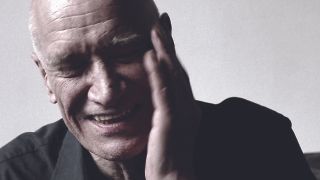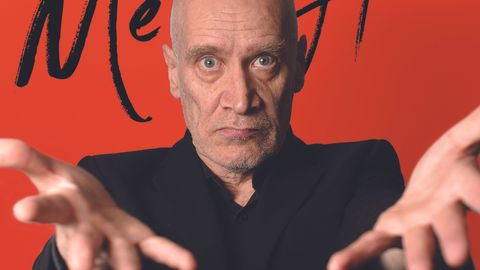This isn’t the first time that Wilko Johnson has told his story: in 2012, he delivered Looking Back At Me, a coffee table-styled photobook with some choice anecdotes. Don’t You Leave Me Here: My Life makes a great companion piece, Johnson once more proving a compelling raconteur with a flair for poetic prose. He also brings the story up to date. Plenty has happened since 2012, of course, and it’s the chapters that deal with that time period that prove among the strongest here, Johnson writing movingly and in unflinching detail.
To recap, in January 2013, Johnson was diagnosed with terminal pancreatic cancer and given 10 months to live. After an emotional ‘farewell’ tour, however, the guitarist sought a second opinion on the advice of cancer doctor and photographer Charlie Chan. The result: a 3kg tumour was removed and his death sentence lifted.
During that time, Johnson also collaborated with The Who’s Roger Daltrey (“one of the world’s greatest rock singers”), and their huge-selling album, Going Back Home, continued a career revival that had begun with Julien Temple’s Dr Feelgood film Oil City Confidential in 2009.
Johnson writes with wry humour and brutal honesty.
Here, with wry humour and brutal honesty, Johnson places us in his mindset as “now three months into extra time”, he feels “numb, unreal”, but on stage can live in the moment, “without regard to anything but the show – no future to look forward to, no past to regret”.
And his, of course, is a colourful past. Born John Wilkinson in 1947 on Canvey Island, he followed the 60s hippie trail to Afghanistan and India, then on his return taught English in an Essex comprehensive and concurrently formed back-to-basics R&B outfit Dr Feelgood with Lee Collinson (soon to be Brilleaux), his spiky machine gun guitar riffs lighting up the pub rock scene and paving the way for punk. “I always admired Lee,” he writes, “although he was four years younger than me, from the very first he seemed to have a maturity and self-possession that made him a natural leader.” As for the group’s stage show, it was “a double act between me and Lee, he would be the gang leader and I his lieutenant with a gun”.
But during the making of their fourth album, ’77’s Sneakin’ Suspicion, tensions between the amphetamine-fuelled Johnson and the rest of the band (who were by now heavy drinkers) led to him being forced to leave. “I was destroyed,” he recalls.
Post-Feelgoods, he helmed the Solid Senders (“a situation Lucrezia Borgia would have been at home in”), joined The Blockheads (whose leader Ian Dury “could be the most offensive person I have ever encountered”), hung out with fellow speed freak Lemmy (“he had a kind of twisted wisdom”) and later added acting to his CV, playing Ser Ilyn Payne in TV series Game Of Thrones. “I had to register hatred and violence,” he reflects of the role. “I can do that. I got the job.”
Johnson may be “a miserable bugger”, but he recounts the highs and lows of his extraordinary life with self-deprecating wit and good humour, and this is an eloquent and genuinely affecting book.


